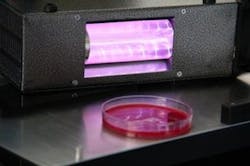Narrow-spectrum UV light at 207 nm may reduce surgical infections
New York, NY--Despite major efforts to keep operating rooms sterile, surgical wound infections remain a serious and stubborn problem, killing up to 8200 patients a year in the U.S. A study by Columbia University Medical Center (CUMC) researchers suggests that narrow-spectrum ultraviolet (UV) light around 207 nm could dramatically reduce such infections without damaging human tissue.
It is well-known that UV light from a standard germicidal lamp emitting a broad spectrum of wavelengths from about 200 to 400 nm is highly effective at killing bacteria; such lamps are routinely used to decontaminate surgical equipment.
"Unfortunately, this UV light is also harmful to human tissue and can lead to skin cancer and cataracts in the eye," says study leader David Brenner, a professor and director of the Center for Radiological Research at CUMC. "UV light is almost never used in the operating room during surgery, as these health hazards necessitate the use of cumbersome protective equipment for both surgical staff and patients."
Brenner and his team hypothesized that narrow-spectrum light at around 207 nm might be capable of destroying bacteria while leaving human tissue unaffected. Because UV light at this wavelength is strongly absorbed by proteins, it is expected to be safe for two reasons: At the cellular level, it cannot reach the nucleus of human cells, and at the tissue level it cannot reach the sensitive cells in the skin epidermis and the eye lens. But because bacteria are much smaller than human cells, this UV light can reach their DNA. "What this means is, if you shone 207 nm light on human skin or eyes, you would not expect to see any biological damage," says Brenner, "but it should kill any airborne bacteria that land on a surgical wound."
Safer by a thousandfold
Brenner and his colleagues exposed MRSA (methicillin-resistant S. aureus) bacteria, a common cause of surgical wound infections, and human skin cells to a krypton-bromine excimer lamp (also known as a KrBr excilamp), which emits UV light only at 207 nm, as well as to a standard germicidal UV lamp. The researchers found that 207 nm UV light was as effective at killing MRSA bacteria as a conventional UV lamp. However, the 207 nm light resulted in a thousandfold less killing of human skin cells than did the standard UV light.
In another experiment, the researchers tested the two UV lamps on a standard tissue-culture model of human skin (which includes the major skin layers, the epidermis and dermis). Exposure to a standard UV lamp caused extensive precancerous changes in the epidermis, while exposure to the same level of 207 nm light did not.
"Our results to date suggest that 207-nm UV light may be an effective add-on to current infection-control measures without the need for protective equipment for staff or patients," says Brenner.
The researchers are now conducting in-vivo tests of the 207 nm lamp. The study, conducted in tissue culture, was published in the journal PLOS ONE.
Columbia University has filed international patent applications for a method for generating a narrow wavelength of UV radiation that can selectively affect and/or kill bacteria.
Source: http://www.eurekalert.org/pub_releases/2013-10/cumc-nul101013.php
About the Author
John Wallace
Senior Technical Editor (1998-2022)
John Wallace was with Laser Focus World for nearly 25 years, retiring in late June 2022. He obtained a bachelor's degree in mechanical engineering and physics at Rutgers University and a master's in optical engineering at the University of Rochester. Before becoming an editor, John worked as an engineer at RCA, Exxon, Eastman Kodak, and GCA Corporation.

